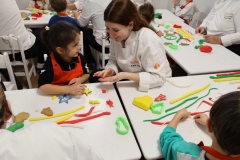
SCHOOL OF APPLIED MANAGEMENT SCIENCES
Gastronomy and Culinary Arts Program
CLM 101 | Course Introduction and Application Information
| Course Name |
Hygiene and Safety
|
|
Code
|
Semester
|
Theory
(hour/week) |
Application/Lab
(hour/week) |
Local Credits
|
ECTS
|
|
CLM 101
|
Fall
|
3
|
0
|
3
|
6
|
| Prerequisites |
None
|
|||||
| Course Language |
English
|
|||||
| Course Type |
Required
|
|||||
| Course Level |
First Cycle
|
|||||
| Mode of Delivery | - | |||||
| Teaching Methods and Techniques of the Course | DiscussionLecture / Presentation | |||||
| Course Coordinator | - | |||||
| Course Lecturer(s) | ||||||
| Assistant(s) | - | |||||
| Course Objectives | This course aims to explain the hygiene rules and sanitation practices for the students to produce safe food. |
| Learning Outcomes |
The students who succeeded in this course;
|
| Course Description | In this course, in order to ensure safety in the kitchen; definition and importance of sanitation, importance of microorganisms, sources of contamination, factors affecting microorganism growth, personnel hygiene in food production, safety in the kitchen and HACCP are covered. |
|
|
Core Courses |
X
|
| Major Area Courses | ||
| Supportive Courses | ||
| Media and Management Skills Courses | ||
| Transferable Skill Courses |
WEEKLY SUBJECTS AND RELATED PREPARATION STUDIES
| Week | Subjects | Related Preparation |
| 1 | Introduction to the Course | |
| 2 | Sanitation and Safety in Food Businesses and Service | Norman Marriott, Robert B. Gravani - Principles of Food Sanitation. 2006, Springer (1-15 & 25-67) |
| 3 | Food Contamination Sources | Norman Marriott, Robert B. Gravani - Principles of Food Sanitation. 2006, Springer (76-82) |
| 4 | Food-borne Diseases | S. J. Forsythe, P. R. Hayes-Food Hygiene, Microbiology and HACCP-Springer US, 2000 Chapter 2 –Food Poisining and Other Foodborne Hazards (21-74) |
| 5 | Purchase and Storage of Food | S. Roday, Food Hygiene and Sanitation, Mc Graw Hill India, 2011 (101-114) |
| 6 | Sanitary Procedures in Preperation, Holding, Serving and Displaying of Food | S. Roday, Food Hygiene and Sanitation, Mc Graw Hill India, 2011 (116-134) |
| 7 | Allergen Management for Food Businesses | Norman G. Marriott, Robert B. Gravani - Principles of Food Sanitation. 2006, Springer (73-81) |
| 8 | Midterm Exam | |
| 9 | Personal Hygiene and Safety | S. Roday, Food Hygiene and Sanitation, Mc Graw Hill India, 2011 (285-295) |
| 10 | Location, Layout and Construction of Premises | S. Roday, Food Hygiene and Sanitation, Mc Graw Hill India, 2011 (161-189) |
| 11 | Cleaning Procedures Cleaning Agents & Sanitizers | S. Roday, Food Hygiene and Sanitation, Mc Graw Hill India, 2011 (191-212) |
| 12 | Pest Prevention and Control, Water Supply and Disposal of Waste and Environmental Pollution S. Roday, Food Hygiene and Sanitation, Mc Graw Hill India, 2011 (216-279) | S. Roday, Food Hygiene and Sanitation, Mc Graw Hill India, 2011 (216-279) |
| 13 | Food Laws and Regulations Quality and Food Standards | S. Roday, Food Hygiene and Sanitation, Mc Graw Hill India, 2011 (311-342) |
| 14 | Building Food Safety Programs in Food Businesses | S. J. Forsythe, P. R. Hayes-Food Hygiene, Microbiology and HACCP-Springer US, 2000 (380-428) |
| 15 | Review of the Semester | |
| 16 | Final Exam |
| Course Notes/Textbooks | Norman Marriott, Robert B. Gravani - Principles of Food Sanitation. 2006, Springer (ISBN 978-0-387-25085-4)
S. Roday, Food Hygiene and Sanitation, Mc Graw Hill India, 2011 (ISBN 978-0-070-70020-8)
S. J. Forsythe, P. R. Hayes-Food Hygiene, Microbiology and HACCP, Springer US, 2012 (ISBN 978-1-4757-5254-0) |
| Suggested Readings/Materials | S. Roller-Essential Microbiology and Hygiene for Food Professionals-CRC Press (2012) (ISBN 9781444121490)
|
EVALUATION SYSTEM
| Semester Activities | Number | Weigthing |
| Participation |
1
|
30
|
| Laboratory / Application | ||
| Field Work | ||
| Quizzes / Studio Critiques | ||
| Portfolio | ||
| Homework / Assignments | ||
| Presentation / Jury | ||
| Project | ||
| Seminar / Workshop | ||
| Oral Exams | ||
| Midterm |
1
|
30
|
| Final Exam |
1
|
40
|
| Total |
| Weighting of Semester Activities on the Final Grade |
2
|
60
|
| Weighting of End-of-Semester Activities on the Final Grade |
1
|
40
|
| Total |
ECTS / WORKLOAD TABLE
| Semester Activities | Number | Duration (Hours) | Workload |
|---|---|---|---|
| Theoretical Course Hours (Including exam week: 16 x total hours) |
16
|
3
|
48
|
| Laboratory / Application Hours (Including exam week: '.16.' x total hours) |
16
|
0
|
|
| Study Hours Out of Class |
14
|
6
|
84
|
| Field Work |
0
|
||
| Quizzes / Studio Critiques |
0
|
||
| Portfolio |
0
|
||
| Homework / Assignments |
0
|
||
| Presentation / Jury |
0
|
||
| Project |
0
|
||
| Seminar / Workshop |
0
|
||
| Oral Exam |
0
|
||
| Midterms |
1
|
20
|
20
|
| Final Exam |
1
|
28
|
28
|
| Total |
180
|
COURSE LEARNING OUTCOMES AND PROGRAM QUALIFICATIONS RELATIONSHIP
|
#
|
Program Competencies/Outcomes |
* Contribution Level
|
||||
|
1
|
2
|
3
|
4
|
5
|
||
| 1 | Successfully applies theoretical and practical knowledge and skills in Gastronomy and Culinary Arts |
X | ||||
| 2 | Carries best practices in terms of work and food security, safety and hygiene in food production |
X | ||||
| 3 | Appreciates, evaluates and makes decisions regarding to visual, textual and nutritional data with respect to food production and presentation |
|||||
| 4 | Recognizes and evaluates the impact of gastronomy on culture and society |
|||||
| 5 | Assumes responsibility for solving complex problems that may occur in the field of Gastronomy and Culinary Arts, both individually and as a team member |
X | ||||
| 6 | Evaluates the knowledge and skills acquired in the field of Gastronomy and Culinary Arts with a critical approach and effectively communicate their ideas and suggestions for solutions in written and oral form. |
X | ||||
| 7 | Possesses necessary knowledge and skills in relevant fields such as gastronomy, design, law and management and effectively apply them to the practice of Culinary Arts |
|||||
| 8 | Uses the technological tools related to Gastronomy and Culinary Arts effectively |
|||||
| 9 | Updates and improve the knowledge, skills and competencies related to Gastronomy and Culinary Arts with lifelong learning awareness and sustainability with an ethical approach |
|||||
| 10 | Collects data in the areas of Gastronomy and Culinary Arts and communicate with colleagues in a foreign language. (European Language Portfolio Global Scale”, Level B1) |
|||||
| 11 | Speaks a second foreign at a medium level of fluency efficiently |
|||||
| 12 | Relates the knowledge gained through the history of humanity to the field of expertise |
|||||
*1 Lowest, 2 Low, 3 Average, 4 High, 5 Highest
NEWS |ALL NEWS
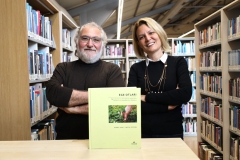
Award-Winning Book Receives Great Interest
The book ‘Ege Otları (Aegean Herbs)’ authored by Asst. Prof. Dr. Betül Öztürk from Department of Gastronomy and Culinary Arts, Izmir University

Appointment ceremony for 104 academics
A special ceremony was held at Izmir University of Economics (IUE) for the 104 academics appointed to professorship, associate professorship, and assistant
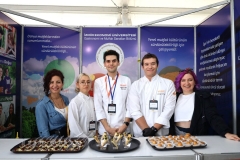
Aegean flavors from the chefs of the future
Izmir University of Economics (IUE) Department of Gastronomy and Culinary Arts left its mark on the 6th Izmir GastroFest, organized this year with
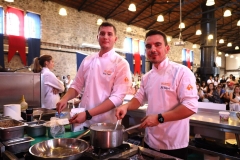
They added flavor to GURMEFEST
GURMEFEST, one of the biggest food, drink and entertainment festivals of Izmir, was ‘flavored’ with the dishes prepared and presented by the
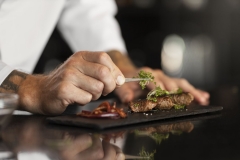
“Izmir and Bodrum will class up”
The MICHELIN Guide, one of the most prestigious restaurant rating systems in the world, has added Izmir and Bodrum to its Turkish
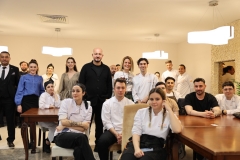
IUE graduates will prepare the flavors unique to Turkish cuisine
Bilsev Group, who is preparing to expand to Dubai this year with its Ferdi Baba, Fabrice Restaurant and Baba Pizza brands, will




